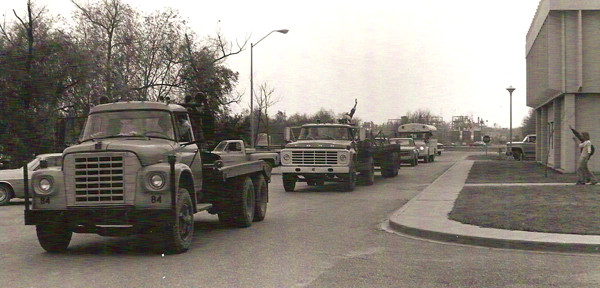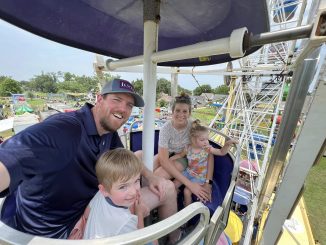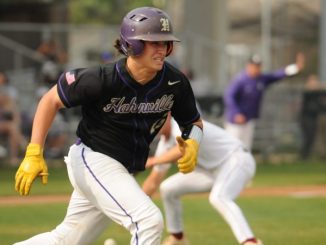
J.D. Bankston was among the Luling Volunteer Fire Department’s first volunteers who has helped celebrate its 50th anniversary by helping tell its story. Fire Chief Craig Petit welcomed Bankston among other firefighters recounting their years of helping fight fires and save people in automobile wrecks.
“These past members were dedicated and contributed a lot of their time to this department, making it what it is today,” Petit said. “Luling VFD was the first department in the parish to obtain a Class 3 fire rating, which save the citizens of the district a lot of money for home and business owners insurance. In addition, the Luling VFD members were very proactive not only in providing fire service, but developing emergency medical technicians to respond to medical incidents.”
Petit recounted the fire department’s growth from a single station, single engine with an outdoor siren to alert responders, fire phones ringing and answered in member home, an active ladies auxiliary to help with fund-raising events and, of course, the roadway “boot shake;” a necessity to operate the department and purchase equipment. Today, the department has grown to four stations, a training facility, six engines, a ladder truck, two service units and a heavy rescue unit. The station also continues to develop paid staff while working to enhance volunteer response.
Bankston recalled some of his calls as a volunteer with the department.
“In the early days, when I first joined, we had to go house to house to raise money and ‘can shakes’ to raise money on the highway,” he said of shaking a can for donations in a relationship that lasted 30 years. “That was our only income – those two things. It was around 1980 when we got the millage passed … making it a whole lot easier to operate. We didn’t have to worry about finances as much. We were able to buy a new truck and put in more time on training.”
When Bankston joined the department in 1970 there were 10 to 12 active volunteers, a number helped grow to about 20.
“It was just something I’d always wanted to do,” he said. “I was working on the Union Carbide emergency staff so it was a good fit.”
Bankston, who lived in Mimosa Park at the time, said they responded to rescue calls and automobile wrecks. He particularly recalled a fire many years ago that they went to just before Christmas in an apartment complex in the Boutte Housing project.
“It was below freezing the whole time we were fighting the fire,” he said. “There was ice everywhere. It was a long ago. The big thing was the breathing apparatus that the firemen wore, when you got ready to change the tanks in the back was nearly frozen, making it hard to put a new tank on. It was cold.”
Bankston also recounted a call that involved a fatality.
A train hit a ammonia truck at a rail crossing on LA 3127 – long before there was an I-310 – and tore the trailer lose from the truck, he said. The truck driver was able to escape injury in the truck that still rolled and the people in the train were burned by ammonia , but they were alright.
“He was sitting right there at the tracks and a cloud of ammonia went over him. He couldn’t get out of his car,” Bankston said. “It was in Paradis, but we ended up working that.”
Although the volunteers dealt with disasters and dangers, Bankston said there was a lot of hard work, but also a lot of good friendships.
“We had a pretty good friendship among all of us,” he said. “You had to learn to work together.”
Fire Safety Officer Pat Beard’s connection with the department goes back to growing up watching his father in action and the lasting impression his volunteerism made on him.
It was 1986 and a bitterly cold night in Luling when Beard said he and his father was responding to his grandmother calling at midnight for help to deal with a beeping fire detector.
“We were going up the street and got to the railroad track when my father says, ‘What is that?’” Beard said. “There was a glow. We came upon a house fully engulfed by fire. We picked up the [fire] engine and it was just me and my dad. When he got out of the truck, he told me, ‘You stay in the truck no matter what.’’ He watched his father trying to put water on the fire on a night so cold that he saw ice form on his face and him shivering. “My dad has always been my hero. He didn’t care about himself. He was about caring for people.”
His father died of cancer in 1998, but Beard said his leadership and legacy has continued and particularly through him.
Beard has literally grown up in the department because of his father, having started as a junior firefighter and moving on to sergeant at arms, captain, deputy fire chief, fire chief and now safety officer.
From the early 1990s, Beard recalled one of his own war stories as a responder.
“We had a structure fire where I was actually put on a team to do roof ventilation and we put an extension ladder and then a ladder on the top of the roof,” he said. “I got up on the roof and started removing the shingles. A short time later, the incident commander radioed to get off the roof because it looks like it’s getting soft.” As Beard tried to brace himself, his hand went through the roof. He had four to five feet to reach the eave and, once there, the other hand went through the roof, too. “It was really spongy. At that time, I saw my whole world go through my mind so I pushed off the ladder, slid to the edge of the roof and jumped about eight foot off that single-story structure to the ground. When I looked up, the roof had collapsed and the ladder has fallen in the house.”
Beard said he just felt really blessed and lucky that he didn’t fall through the roof.
“It was one of those ‘aha’ moments,” he said.
At age 44, Beard, who has been with the department 20 years, considers his time with the department a blessing, but he also wants to look to the department’s future.
He saw firefighters go from the plastic fire helmet and long coat to getting better rubber boots and still the long coat to a burst of technological advancements with newer and better designs with fire protective gear. Gone are the days when a fellow firefighter gave up his breathing gear to Beard, saying he needed it more, because they didn’t have enough funds to buy them for all the volunteers.
Now, Beard strives to invite new volunteers.
“Everyday people have competing commitments so our responders make the space and time to learn, grow and train.
Petit agreed about the importance of volunteers.
“The volunteers spend a lot of time away from their home and families to protect life, property and the environment,” he said. “ None of this is possible with out the support of the spouses, significant others and family members. I sincerely thank you for the sacrifice you make to our community.”




Be the first to comment